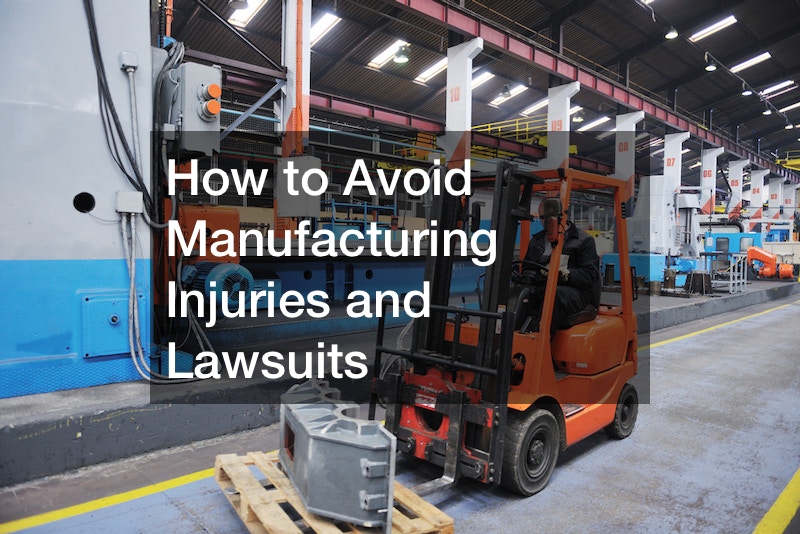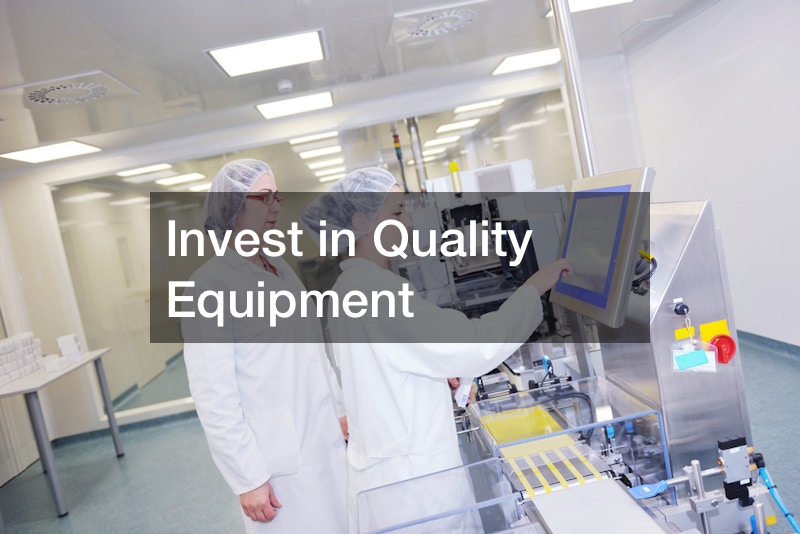

The manufacturing industry has many safety risks; for example, according to OSHA, machine operators experience around 800 deaths and 18,000 injuries yearly. The manufacturing sector is also filled with other injuries like slips & falls, moving vehicle accidents, chemical burns, overexertion, and repetitive & stress injuries. Unfortunately, in addition to the lost human resources, reduced productivity, low staff morale, and poor safety record, most of these injuries also result in costly lawsuits. Therefore, as a manufacturer, you must prevent these injuries from occurring, thus saving you a world of trouble. Below are top tips on how you can avoid manufacturing injuries and protect yourself from potential lawsuits.
Evaluate and Eliminate Hazards

According to OSHA, many workplace injuries and accidents occur because of failure to identify and recognize safety hazards. The risk of accidents can even be higher in the manufacturing industry as it involves a lot of machinery and processes that can expose your employees to several dangers. Therefore, one of the top ways to protect yourself from manufacturing injuries and lawsuits is by identifying, evaluating, and eliminating safety hazards in your workplace.
There are several types of hazards found in a manufacturing plant. The most common are mechanical hazards caused by moving parts, objects, and machinery, for example, forklifts, blades, conveyors, pulleys, rotating shafts, etc. Fortunately, you can mitigate or eliminate the risk of these hazards by using barriers, guards, and sensors to prevent contact with employees. In addition, you should establish and maintain stringent safety protocols that all workers must follow when working with mechanical equipment or near them.
Chemical hazards are also common in the manufacturing sector, and you can eliminate them by ensuring that all chemical materials are properly stored in sealed and marked containers. Explosions are another major danger, especially when dealing with flammable liquids or high-pressure pipes, but you can contain the risk posed by using explosion-proof seals. Other hazards you must be aware of (and contain) include electrical shocks, wet or slippery floors, and gas leaks.
Take the Necessary Safety Precautions
Manufacturing injuries are unplanned; after all, an on-the-job injury and the severe consequences that follow are the last thing any manufacturer wants. However, many of these injuries can be prevented, thus saving you and your employees a lot of problems. One of the best ways to prevent injuries is by taking the necessary safety precautions.
The use of safety equipment is one of the top safety precautions you can invest in as a manufacturer. This should include personal protective equipment (PPE) like gloves, helmets, safety glasses, face shields, and overalls, which can protect employees from hazardous materials, heat, noise, flying debris, and other hazards. Besides PPE, you should also invest in other safety equipment like back braces (for heavy lifting), fall arrest systems, ladders, fire extinguishers, and others, which can also be valuable in preventing accidents or reducing the severity of injuries when they occur.
Several other safety precautions can help to prevent injuries in your manufacturing plant. For example, you can invest in product safety for interconnects, thus preventing defects in your manufacturing equipment that can lead to serious accidents and injuries. Other precautions include investing in safety labels and warning signs, providing adequate lighting to improve visibility, and marking all the areas in the manufacturing plant (especially the exit signs).
Invest in Quality Equipment

According to the National Safety Council, equipment-related accidents are the four leading causes of workplace injuries, accounting for 705 deaths and 196140 non-fatal injuries in 2021. The risk of such accidents and injuries can even be high when dealing with faulty or malfunctioning equipment. And, unfortunately, you’re also likely to face lawsuits with costly compensations if employees are injured due to unsafe equipment. Therefore, investing in quality and safe equipment is another way to prevent manufacturing injuries and costly legal processes.
One of the top ways to guarantee manufacturing equipment safety is to purchase them from reliable and reputable suppliers with a good safety record. This will help prevent the risk of defects caused by overheating, assembly mistakes, faulty wiring, poor-quality materials, and inadequate safety features. Of course, in addition to purchasing quality equipment, you should invest in professional installation services to prevent and mitigate the risk of malfunctions, accidents, and injuries.
As a manufacturer, you can also prevent injuries and lawsuits by ensuring that all tools and equipment are promptly replaced at the end of their lifespan. Of course, the cost of purchasing new equipment can be restrictive, especially given how expensive some manufacturing machines are. Fortunately, you can consider other more affordable options, for example, leasing from an equipment rental company.
Maintain and Repair Your Equipment
Failing to maintain or repair equipment can create unsafe working conditions, increasing employees’ risk of accidents, injuries, and death. In addition, poor maintenance of equipment can also lead to costly liabilities if your workers sue you. Therefore, investing in quality maintenance and repair of your equipment is another excellent way to prevent manufacturing injuries and lawsuits.
Of course, regular maintenance is one of the top ways to ensure that your manufacturing equipment is in top shape. Most of the equipment will come with a manufacturer-recommended maintenance schedule, but you can also create a custom schedule depending on equipment use. In addition to maintenance, you should also invest in routine inspections, which can help to detect issues before they arise.
Unfortunately, your manufacturing equipment will occasionally break down due to wear and tear and heavy use. In such situations, you should hire a local utility equipment repair company for prompt repairs, even for the smallest issues. This will help to prevent a situation where your workers operate faulty equipment, leading to accidents and injuries.
Lastly, on top of repairs, you should invest in preventive maintenance. For example, you can replace your manufacturing equipment parts before the end of their lifespan. Consequently, this will help to prevent equipment malfunctions that can lead to employee injuries. Also, preventive maintenance can reduce the frequency of costly breakdowns, thus saving you money.
Invest in Manufacturing Automation

According to Safety and Health Magazine, around 80 to 90% of workplace accidents and injuries can be attributed to human errors. These errors can result in severe injuries, loss of life, and property damage in the manufacturing sector. Luckily, many of these errors and the resulting manufacturing injuries can be prevented through automation of the manufacturing processes.
Good automated manufacturing practices help to remove the human factor from the equation during various processes. Consequently, this helps reduce the risks of accidents due to distractions, stress, poor training, or lack of awareness. On top of that, automation can relieve your employees of repetitive, tedious, or hazardous tasks, which are one of the leading causes of injuries and lawsuits in the manufacturing sector.
The other benefit of automation in the manufacturing industry is that it can allow for more accurate and effective safety monitoring. For example, computer systems and artificial intelligence can help detect and identify errors within your equipment or manufacturing systems. As a result, you can intervene on time, thus averting serious accidents. In addition, automation can make it easier to track things like maintenance schedules and repairs, further improving the safety of your equipment.
Train Your Employees Properly
According to the CDC, training is an effective solution that helps to reduce workplace injuries, deaths, and illnesses. That’s because training equips employees with valuable skills that can keep them safe. Therefore, if you’re searching for ways to prevent manufacturing injuries and lawsuits, consider investing in employee training.
Safety training is one of the top ways to prevent injuries in your manufacturing plant. Good safety training should cover things like being aware of your surroundings, identifying & eliminating hazards, reporting & dealing with incidents, and properly using safety equipment. In addition, the training should cover areas like first aid and protocols for evacuating to a safe place in the event of an accident.
On top of safety training, you can prevent on-the-job injuries by hiring skilled employees and training them on properly using manufacturing equipment. For example, if you’re a crankshaft manufacturer, you must hire qualified employees familiar with the professional crankshaft machining process. In addition, you need to continuously train them to ensure that they’re adept at using all the tools and specialized manufacturing equipment in your plant. Doing this will reduce the risk of accidents caused by human error, thus protecting your company from workplace injuries and lawsuits.
Don’t Cut Corners

Cutting corners to complete manufacturing tasks more quickly or reduce overhead expenses can be tempting. However, such actions are likely to result in accidents that can cause severe manufacturing injuries. On top of that, accidents caused by cutting corners can lead to lawsuits that can result in expensive workers’ compensation and stiff penalties. Therefore, to avoid workplace injuries and lawsuits, you should avoid cutting corners in your manufacturing operations.
Using substandard equipment and raw materials is a good example of where cutting corners can lead to injuries and lawsuits. For example, say your company manufactures commercial sealcoating products. Then, using poor-quality materials or manufacturing equipment can expose your employees to unsafe materials and increase the risk of accidents while on the job. Therefore, you’re better off investing in quality equipment and materials even if they cost more, as this can save you a lot of problems later.
There are several other ways in which cutting corners can lead to accidents and injuries. For example, not investing in quality protective equipment, hiring unqualified employees, rushing the manufacturing processes, and delaying equipment maintenance and repairs can quickly result in accidents. In addition, your company is also likely to suffer from lengthy shutdowns and a poor reputation, making any benefits gained by taking shortcuts worthless.
Prevent Fatigue Amongst Your Employees
According to a report by the National Safety Council, fatigue is responsible for around 13% of workplace injuries. That’s because fatigue causes an increase in human errors, thus increasing the risk of accidents, injuries, and, in worst cases, loss of life. Therefore, as a manufacturer, protecting your workers from fatigue is one of the top ways to avoid manufacturing injuries and lawsuits.
Unfortunately, in the manufacturing sector, fatigue can lead to other problems like reduced productivity and poor-quality products. For example, say your company deals in commercial metal fabrication. Then, having tired and overworked employees can result in poor-quality metal products that can harm your company’s reputation even if you avoid workplace injuries.
Luckily, several tips can help to protect your employees from fatigue. First, you should hire enough workers, thus allowing you to schedule shorter work shifts and give your employees enough time to rest. In addition, you should rotate workers through strenuous or repetitive tasks that can cause employee injuries.
Allowing your employees sufficient off-duty and vacation time is another excellent idea for preventing workplace fatigue. In addition, you should create an environment where employees are comfortable reporting fatigue, especially when working in risky areas. This will help avert accidents and injuries while boosting employee morale and productivity.
Invest in Quality Healthcare

Manufacturing injuries can still occur even after taking extraordinary measures to prevent them. And unfortunately, your company can still be liable for these injuries, despite how careful you are. Luckily, you can mitigate the severity of these injuries (and the resulting lawsuits) by being proactive. One of the best ways to be proactive in the case of workplace injuries is by investing in quality healthcare services for your employees.
Several health services can help to protect your company in case of on-the-job injuries. For example, having a good first-aid kit (and staff trained in first aid) can help stabilize injured workers and prevent their condition from becoming severe. This can help reduce the risk of long-term complications or even death, significantly decreasing your company’s liability.
You can also invest in on-site medical services or make arrangements with nearby local emergency rooms so injured workers receive treatment as soon as possible. Again, this can help to significantly reduce the severity of workplace injuries. And as a bonus, on-site medical staff can help to monitor your worker’s health and wellness, flagging issues like fatigue and poor eyesight that can increase the risk of manufacturing accidents.
Manufacturing injuries are every manufacturer’s nightmare. On top of making employees unavailable for work, they can also result in other far-reaching consequences like costly lawsuits, lengthy shutdown of operations, poor employee morale, and a ruined reputation. Fortunately, the above are some top ways to prevent these injuries, the resulting lawsuits, and other problems they bring.


